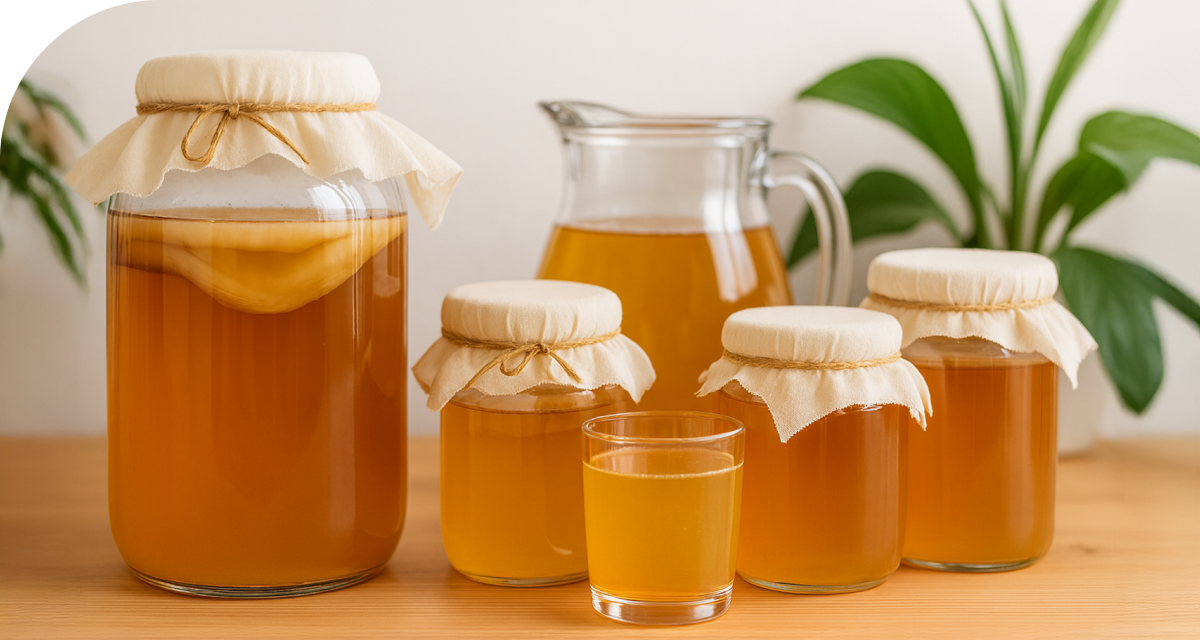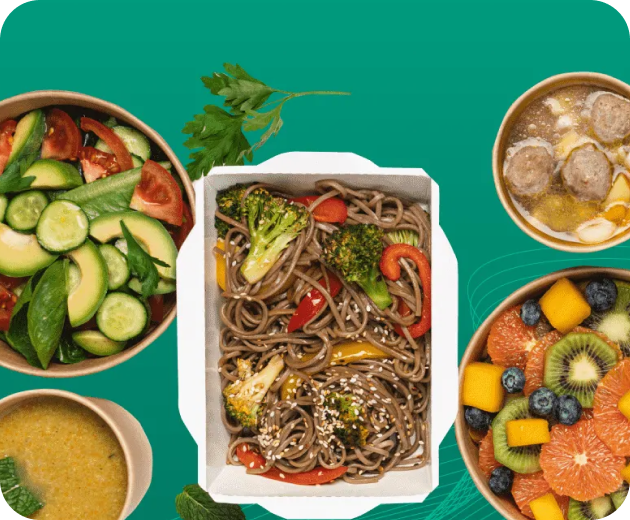Kombucha Trends 2026: This Viral Beverage is Fermented, Functional and Fun
2026 is all about functional foods, and kombucha is steadily bubbling to the top of the charts. Once a quirky and niche health drink, kombucha has evolved into a go-to beverage option for consumers around the world thanks to its nutritional benefits, dynamic flavor options and all-around singularity.
What is kombucha and why is it popular?

Brewers typically produce kombucha by combining brewed black or green tea with a symbiotic culture of bacteria and yeast (aka SCOBY). Producers often enhance and customize the tart, effervescent taste of their products using different sweeteners and natural flavorings.
In addition to its unique flavor offerings, kombucha’s fermentation process results in a functional beverage with innate probiotic properties. In today’s health-driven food and beverage culture, these probiotic properties make kombucha an ideal choice for consumers looking to get more mileage out of their beverage selections. With Tastewise reporting 50% YoY growth in social discussions about kombucha, it’s fair to say consumers are more excited than ever about this functional indulgence.
What is the market trend for kombucha?
The kombucha market has experienced significant fluctuation over the years, however, it is currently valued at roughly $2 billion globally and is expected to be worth nearly $6 billion by 2029. Several broader industry trends may explain the recent growth in the kombucha market, such as:
- Growing interest in functional and healthy foods
- Overlaps with craft beer trends that embrace local ingredients
- High consumer demand for artisan food and beverage products
- Industry-wide interest in sustainably-sourced and organic offerings
- Sustained desire for Instagram-worthy indulgences
The most successful kombucha brands are leveraging all of these trends to deliver eye-catching beverages that meet consumers where they are in their pursuits of functional nutrition and unique consumption experiences.
Health benefits of kombucha
The functional properties of kombucha are without a doubt the most attractive attributes of this popular wellness beverage. Some of the most widely-recognized benefits include:
- Gut health support: The kombucha fermentation process yields probiotic cultures that promote healthy digestion and microbial balance.
- Immune boost: Many kombucha products include antioxidants that can help reduce inflammation.
- Natural energy: Some brewers make kombucha from caffeinated teas that deliver a natural energy boost.
- Detoxification: Kombucha’s organic acids may support liver function and help remove toxins.
- Stress reduction: Some brands are further capitalizing on the functional food frenzy by adding adaptogenic ingredients like ashwagandha and turmeric to their brews.
All of these benefits make kombucha a standout among health and wellness-oriented consumers. Some people even treat kombucha like an alternative to alcoholic beverages and use this functional favorite to curb cravings while enhancing their overall well-being.
Sales and consumption stats to know
Brands looking to dive into the kombucha market or shore up their current position can rely on market data to drive their branding choices. Here are a few important data points to know about the state of the kombucha market:
- According to Tastewise, almost 30,000 U.S. restaurants offer kombucha products on their menus
- Berry is one of the most popular kombucha flavors
- Analysts project the kombucha market will grow at a rate of 19.4% CAGR over the next 5 years
- 37% of kombucha consumers say sustainability is important to them
- Kombucha consumers also regularly post online about coffee, craft beer, cold brew and cider
- The top consumer need driving kombucha consumption today is “fitness”
As you can see, kombucha consumers are specifically seeking out products that support their health without compromising on quality or sustainability. As kombucha continues to evolve from a health-store exclusive into a mainstream beverage option, it’s important for brands to stay tapped into the specific needs and interests of their audiences.
2026 outlook: The future of kombucha
The latest kombucha stats coupled with our current understanding of consumer behaviors makes clear that this functional beverage is likely going to grow in popularity in the years ahead. In the future, we can expect to see ongoing innovations with respect to flavor enhancement and fermentation in order to deliver a broader spectrum of flavor options, as well as additional health benefits.
We may also see a growing interest in kombucha brands that specifically market themselves as craft beer alternatives so consumers no longer have to sweat the kombucha vs. craft beer debate. By 2026, kombucha will likely be recognized not just as a health beverage but as a premium, flavor-forward product that can fill in the gaps in the current beverage market while helping consumers achieve their health goals.
Final thoughts
Kombucha has finally broken free from the confines of the health food market and is steadily making its way into popular culture. 2026 has provided the perfect backdrop for this meteoric rise, as consumers have become more and more vocal about their desire for functional foods that fit into their diverse lifestyles.
As kombucha continues to trend alongside other food trends and beverage trends, brands will want to innovate thoughtfully and be intentional about how they show up to meet the evolving needs of modern consumers.
FAQs about Kombucha trends
Kombucha is trending because it offers a unique combination of aesthetic appeal, specialized flavor and documented health benefits.
Kombucha consumption has been steadily increasing over the past several years and is expected to grow by almost 20% CAGR by 2029.
Kombucha is making appearances in cafés, breweries and restaurants across the U.S., with Tastewise reporting that nearly 30,000 establishments currently serve kombucha products.
Berry tops the charts for kombucha flavors, but other exciting ingredients like ginger, lemon, cherry and mint are also piquing consumer interest.
Kombucha is one of the major players in the functional beverage market due to its lauded probiotic benefits.
North America currently boasts the largest share of the kombucha market.
Yes! On par with craft beer and canned wine trends, kombucha is making major impressions in ready-to-drink formats that maximize both convenience and shelf life.
Since kombucha is typically served chilled, sales tend to spike during the warmer months when consumers are looking for frosty and refreshing beverages.
Yes, millennials and Gen Z are generally viewed as being more likely to purchase and consume kombucha, as these generations are particularly health and sustainability-driven.




